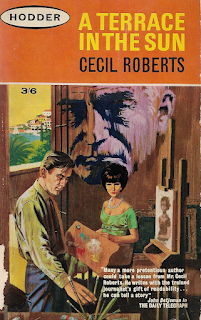To celebrate the launch of Follow the Moon and Stars here's a new series on #NottsWriters:
 |
| Cecil Roberts (1892-1976) |
“At 15, with a mother and myself to keep, I began writing,” said Roberts after his father died suddenly. Working as a weights and measures inspector he learned to operate a typewriter, using it to type out poems and articles. In 1912, after winning the annual Henry Kirke White prize with his long poem The Trent, Roberts had five books of verse published in five years, then, “I had a living to earn with my pen, and turned to more remunerative work,” he said.
Reflecting in later life, he wrote: “The beginning was tough but I was never a beatnik nor saw any merit in the kitchen sink” (he hated Sillitoe’s Saturday Night and Sunday Morning). “In this marvellous world all my writing has been an expression of joy in the journey.”
After work as a war correspondent, and alongside work as a journalist and editor at the Nottingham Journal (he welcomed Graham Greene to Nottingham), it was the success of his first novel Scissors (1923) that launched his career as a novelist.
“Scissors is the nicest boy in English fiction,” wrote Israel
Zangwill.
Spears Against Us (1932), the story of the downfall of an
old Austrian family, is one of his most famous novels.
The other huge seller being Victoria Four-Thirty (1937)
about a world-famous composer, a honeymooning couple, a novelist in search of a
plot, a German film star and a young crown prince, who are among the disparate
group of travellers on a journey to Europe.
John Betjeman wrote: “Many a more pretentious author could take a lesson from Mr Cecil Roberts. He writes with a trained journalist’s gift of readability…he can tell a story.”
A Terrace in the Sun (1951) is about a small boy, a miner’s
son, who became a famous artist. The book was a success but Roberts regretted
not calling it A Nottingham Lad as there was so much of his early life in its
pages.
David and Diana (1929) also features Nottingham and Goose
Fair (the book's US title).
Pilgrim Cottage presents a picture of Russia in the first enthusiasm of the revolution, contrasted with traditional England.
Cecil Roberts was a snob and a proper name-dropper, but it’s for good reason that he had a room named after him at Angel Row’s Central Library and he was the first Nottingham novelist to become a Freeman of the City. His novels often skillfully blend history, information and romance. If we ever enter another lockdown, try his five volume autobiography, too, when Roberts' incredible memory comes into its own.











No comments:
Post a Comment